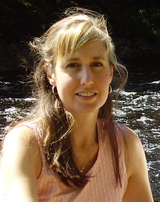 Karen Schindler Karen Schindler is the managing director of the Poetry London Reading Series and a contract researcher at UWO’s Faculty of Education. Previous professions include chemical engineer, systems analyst, and high-school teacher. Her poetry and poetry book reviews have been published in literary journals such as The Antigonish Review, the Fiddlehead, the Malahat Review, and The Windsor ReView, and she was shortlisted for the 2008 CBC literary awards and longlisted for Descant's 2011 Winston Collins Prize.She has served as a grant juror for the Ontario Arts Council and a judge for the Hamilton Literary Awards. Her chapbook press, Baseline Press, was launched in the fall of 2011. RUST TALK WITH KAREN SCHINDLER Kathryn Mockler: Why did you decide to start a chapbook press? KS: Because I was pretty sure I would love it. I’ve spent the last nine years happily becoming more and more immersed in poetry. Doing some writing. Organizing readings. Going to workshops and literary festivals. Picking up some editing and reviewing skills. And reading poetry—books and books of poetry. A friend, Ottawa poet Sandra Ridley, published a chapbook with Jack Pine Press in 2008, and it just blew me away—the book itself. It was such a beautiful thing. A piece of art. I wanted to be involved in the making of something like that. And I saw it as a natural extension of the other poetry-related things I’d been doing. KM: Why is it called Baseline Press? KS: London is home to two Baseline Roads—I’ve lived on one of them for the last 15 years, and I grew up on a side street of the other. Also, a baseline is a starting point--something basic and essential to refer back to. Although running a press is a continuation of the things I’ve been doing, I like to think of it as a taking-off point for me, and hopefully for some of the poets I’ll publish too. KM: Who is in the fall line up? Is there a particular theme for the press or how did you choose your authors? KS: I’m launching three poetry chapbooks this fall--The Black Car by Christine Walde, Sputniks by Andy McGuire, and Cardiogram by Danielle Devereaux. The London launch is Wed. Nov. 2 at Brennan’s Beer & Bistro. And we’re doing a joint launch with Cactus Press in Toronto on Thu. Nov. 3, as part of the Livewords Reading Series. Christine and Andy I’ve known for several years through the Poetry London Reading Series. And Danielle I met two years ago at a poetry festival. They’re all terrific poets on their way to publishing their first full-length collections. The chapbook is the perfect stepping stone towards that. I’m also publishing two single-poem broadsides—by Jeffery Donaldson and Sharon McCartney. As well as helping new writers take that first dip into the publishing pond, I’m looking forward to working with more established poets who I admire. KM: How many books are in each edition? KS: 75 copies of each chapbook, and 50 copies of each broadside. Those numbers may change from year to year, as I figure out demand. KM: How did you approach book design? KS: I did a lot of playing around before I approached any poets—made a few mock-ups using a dozen poems by Wallace Stevens. Pretended it was the real thing—shopped for cover stock and fly-leaf, chose a title, designed a cover, experimented with layout. This gave me an example to present to my prospective authors. Once each poet was on-board, the design was very much a joint effort. Each provided input regarding paper, graphics, etc. I made suggestions they didn’t like, and vice versa. Compromise is a given. KM: What surprised you the most about the process of launching a press? KS: I was overwhelmed by the support of the small-press community. I knew very little about how it all worked—paper suppliers? printing options? poet royalties? A few presses in particular—Cameron Anstee’s Apt. 9 (Ottawa), and Jim Johnstone’s Cactus Press (Toronto)—were over-the-top helpful. Seemed not the least bit bothered by my endless emails and phone calls. Everyone who does this seems to be in it for the love of poetry, and there’s a nice camaraderie between the presses. I’ve seen this at the small-press fairs I’ve attended too. So I’ve never felt stuck at any point this year. Good advice was always an email away. The other surprise was how much I enjoyed the hands-on work—the paper cutting, the folding, the thread binding. It became kind of a meditative thing for me. I bought a terrific German-made rotary paper cutter, which I’ve kind of become addicted to (if anyone has any paper they need cutting…) KM: Did you face any challenges? KS: My first year has involved a tremendous amount of work, that’s for sure. Especially because I don’t yet have the funds to buy publishing and design software that allows for shortcuts. But I was prepared to put some hours into this. One thing that perhaps took me the whole year to figure out (and that I still can’t get my head around) is how much mistake paper I’d go through… KM: Do you have any specific goals for the future? KS: I would love to have access to a letter-press machine at some point. Especially for broadsides. KM: London's had a rich art and literary history. As a poet, reviewer, reading event organizer, and now publisher, can you tell us a little bit about the literary scene in London, Ontario today? KS: The Poetry London Reading Series, started by poet Cornelia Hoogland, is at the top of my list. Over the last seven years we’ve featured some of the country’s best (Lorna Crozier, coming October 19th!) as well as giving local writers a chance to take the stage. The poetry community that has grown around the series and the associated workshops is a dedicated group. And we’re always looking for new poetry aficionados. The series runs out of Landon Library in Wortley Village. And there’s plenty more going on in London. We’re home to a number of excellent writers. Poet Laureate Penn Kemp has done a great job stirring things up this year—with her “Poetry in Motion” bus project, for example. London’s Kitty Lewis, general manager of Brick Books (one of the country’s top publishing houses) is a huge local poetry cheerleader. The London Writers Society is a big support to the city’s writers. And then there are the people you don’t hear so much about, who are doing their thing every day to nurture literature in the community—English teacher Ola Nowosad, who was involved in the Poetry In Voice high school recitation pilot project this year; Kelly Bradley, who facilitates the Grit Uplifted creative writing group for people who are homeless; Amy Van Es, who just launched Writtle Magazine. There are dozens more. Hats off to all of them. KM: Do you have any advice for new writers and aspiring editors or publishers? KS: The piece of advice I keep coming back to, concerning all things creative, was given to me six years ago when I attended a writing program at Banff. I was very new to writing and when I saw the work of some of the other participants, I was convinced that I was only there due to some fluky clerical error. One day one of the faculty, novelist Curtis Gillespie, told me that years earlier, when he himself had attended the program as a student, he had felt the same way. But he kept at it. And he told me that if you took all those intimidating writers he’d been thrown in with, and looked at where they were at today, you’d find that very few of them were still writing and getting published. But he was. Point being, to do something, you don’t have to be the best at it right off the bat. The desire to DO it counts for an awful lot. 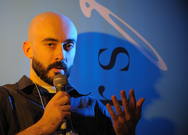 Zachariah Wells Photo by John W. MacDonald Zachariah Wells is the author of Unsettled (Insomniac Press 2004) and Track & Trace (Biblioasis 2009) and the co-author, with Rachel Lebowitz, of Anything But Hank! (Biblioasis 2008), a children's story illustrated by Eric Orchard. He is also the editor of Jailbreaks: 99 Canadian Sonnets (Biblioasis 2008) and The Essential Kenneth Leslie (Porcupine's Quill 2010). Originally from PEI, Wells lives in Halifax, where he works as a freelance writer and editor, and seasonally for Via Rail aboard the Ocean Ltd. Zachariah will be reading at the International Festival of Authors October 19-30, 2011. RUSTY TALK WITH ZACHARIAH WELLS Kathryn Mockler: How did you first come to writing poetry? Zachariah Wells: As with most things in my life, quite by accident. I always thought I'd be a writer, but had a vague notion that I'd write novels. I wasn't really into poetry. Then I wrote a couple of plays because I was in a theatre society. Then I took a couple of classes in university that introduced me to modern poets writing in an idiom I recognized and identified with, and I just started writing poems. KM: What keeps you going as a poet? Or why do you write? ZW: I try only to write when I really feel compelled to. As a consequence, I often go weeks between poems. So I don't really keep going. I just chug and sputter along. I keep at it because I have yet to grow bored of it. KM: What is the revision process like for you? ZW: Teachers tend to hate it when I answer this question, because the fact is that it is usually pretty light. I do a lot of my writing in my head, so by the time I start typing something out, it's already gone through several imaginary "drafts." Revision for me tends to be more a matter of figuring out which poems are worth keeping and which to ditch. That said, it took me many years of practice to get to this point. I used to spill out very rough drafts and then hack and chip away at them till they either fell apart or attained some kind of shape. It wasn't until I'd internalised revision as a process that I started writing the way I do now. KM: How would you describe the writer/editor relationship? ZW: Depends entirely on the editor. I've been on both sides of the table, so it's a dynamic I'm pretty comfortable with. An editor should make as strong a case for whatever changes s/he thinks necessary, but needs also to respect the writer's wishes. But the writer better be able to come up with a good reason for rejecting an editor's suggestion. Any writer who won't listen to a good editor's counsel is a fool. KM: What authors or books would you recommend to new poets? ZW: As many as possible. It's only by reading deeply and widely that you'll figure out who you are as a writer and what you might be capable of. KM: A piece of literary advice for new poets? ZW: How about a piece of extra-literary advice? Because life and work are not separate things: take chances in your life. Don't follow the path of least resistance. The more interesting things you do and the more weird things that happen to you, the more you'll have to write about and the more wisdom you'll bring to the task. KM: Do you have any advice to help new writers prepare to read their work to an audience? How do you prepare? ZW: Know it inside and out. Memorize it. Read it aloud to yourself, to your partner, to your pets. Record it and play it back. Respect your audience. They came to hear you, so make it as good as you can. If you're not comfortable with public speaking, get involved in amateur theatre, take voice lessons, etc. A reading should be something to enjoy, not tolerate. KM: Your funniest literary moment, if you have one. ZW: A well-known poet and philosopher once offered me condolences on the diminutive stature of my membrum virile. It's more funny because of who it was than what she said. KM: What you are working on now? ZW: This fall/winter, I'm collating and revising eight years' worth of literary criticism for book publication. I'm also editing a collection of poems by the excellent senior poet John Smith. And I'll probably write a few poems, but maybe not. 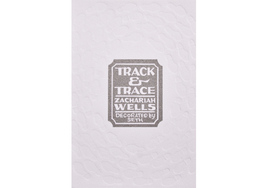 ZACHARIAH WELLS' MOST RECENT BOOK Track and Trace, Biblioasis, 2009 Description from Biblioasis: The poems in Zachariah Wells’s second collection range from childhood to dimly foreseen events in the future; they idle on all three of Canada’s coasts, travel the open road, take walks in the city and pause on the banks of country streams and ponds. Using an eclectic array of techniques and forms, from haiku to a crown of sonnets, in a voice that is personal but never private, Wells sketches a fragmentary biography of a life in progress, a study of post-industrial nomadic restlessness in a rootless age. Both elegiac and celebratory, Track & Trace considers how we live, how we shape our lives and how we are eroded and drifted by time and circumstance. 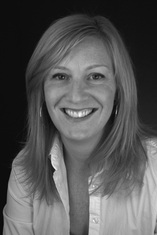 Jennifer L. Knox Jennifer L. Knox Jennifer L. Knox’s new book of poems, The Mystery of the Hidden Driveway, is available from Bloof Books. Her poems have appeared in The New Yorker, American Poetry Review, Ploughshares, and four times in The Best American Poetry series, including the upcoming 2011 edition. She is currently at work on her first novel, tentatively titled, Captain Cook Returns. RUSTY TALK WITH JENNIFER L. KNOX Kathryn Mockler: How did you first come to writing poetry? Jennifer L. Knox: I was 19. I wrote poems to go around the drawings I did. KM: What keeps you going as a poet? Or why do you write? JLK: It makes me want to go on living.:KML What is the revision process like for you? Awesome. Writing a poem is like making a game only you know how to play. Every time you revise it, you make better rules for the game. Hopefully. You can also lose everything. KM: How did you deal with rejection when you first started out? JLK: I envisioned myself as a fabulously successful writer, cutting off the rejector's head with a samurai sword, then lobbing the head in the air and smashing it with a baseball bat. KM: How would you describe the writer/editor relationship? JLK: Sexy as shit. My editor, Shanna Compton (also my publisher), is the best editor on the planet because she has a light tough. She's a fabulous poet, and knows how much you can muck with something before you kill its soul. KM: What authors or books would you recommend to new poets or writers? JLK: Follow what you love. KM: Is there a poet that had a significant impact on your literary life? JLK: Wallace Stevens, James Tate, Richard Hugo, Denis Johnson, James Galvin. KM: A piece of literary advice for new poets? JLK: Indict yourself. KM: Your funniest literary moment, if you have one. JLK: I was reciting what I thought was a very funny poem, and no one was laughing. There was a song in the poem that I had to sing to the tune of “My Country Tis of Thee” with all kinds of dirty words in it, and everyone was just staring at me. It was like a Twilight Zone episode. I never read that poem in public again. KM: What you are working on now? JLK: My first novel. 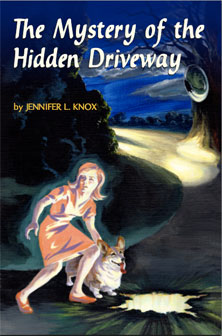 JENNIFER KNOX'S MOST RECENT POETRY BOOK The Mystery of the Hidden Driveway Publisher: Bloof Books Description from Bloof Books A review in Coldfront Mag A review in Constant Critic A review in Publisher's Weekly A review in Tarpaulin Sky Bob Hicok says, Knox's poems knock me out. They have a pace of imagination, an ease of inventiveness that gives me an excuse to use the word brio. Liquid, they river by with their danger and violence, their stories of screwing up and not fitting in. The oddities of her work create a space in which it's possible to be oddly sincere, as in a group of poems about cars which present, over and over, the difficulty of getting anywhere without accident or breakdown. To read these poems is to believe that accident and breakdown ARE the way forward, and to feel someone trying to interrogate the past generously enough to allow room for extremes of response, from shouting to atonement."Who will tell me stories/of the flowers I actually got?" It’s as if Knox is asking, what really matters, in poems that move powerfully toward an answer. David Kirby says, Modern poetry in general is "mostly grey clouds," says Jennifer L. Knox in her poem 'Modern Poetry,” but throughout this collection you’ll see a red-nosed clown who dispenses useful wisdom on vegetarianism in Houston (not recommended), sex with your stepmother (fantastic!), serial car accidents (only if you want to hear your father ask “Is someone paying you to do this?”), and that Grow Your Own Cocaine Class you’ve always wanted to take at the Y (hint: after harvesting, do not leave product in unattended oven). Of all the clowns in the poetry circus, Knox is my favorite because her work is stunning to look at, full of showbiz savvy, and more than a little scary. The last thing it is is grey. Noelle Kocot says, Jennifer L. Knox's poems are very funny. That goes without saying. But they are also poignant, smart and compassionate. I love this poetry, and I feel very close to it. Knox is the kind of author one wants to be friends with, in Holden Caulfield's sense, after reading the work. As far as I'm concerned, there is no higher compliment for a writer. Sharon Mesmer says, Man, this book is fucking genius, and I never say shit like that 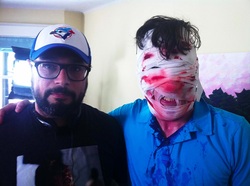 Vivieno Caldinelli Vivieno Caldinelli Vivieno Caldinelli's award winning work has appeared on CBC, CTV, CityTV, The Comedy Network, Bravo!, and TMN. Vivieno is an alumnus of both the Berlinale Talent Campus of the Berlin International Film Festival and the Toronto International Film Festival Talent Lab. In 2005-2006, Vivieno participated in the Canadian Film Centre’s Directors Lab. His film, If I See Randy Again, Do You Want Me To Hit Him With The Axe? was produced with the CFC's NBC/Universal Short Dramatic Film Program. It was invited to over 25 festivals around the world including it’s premiere at the 2006 Toronto International Film Festival. It was nominated for over 10 awards including for 4 nominations at the 2007 Canadian Comedy Awards. In 2009, Vivieno was the Creative Producer, and served as both a Writer and Director on the Comedy Network Series, Hotbox. Currently, Vivieno is in development with Corus, Telefilm, JFL, and CFC Comedy Lab with his feature film, The House They Screamed In, and he just finished directing the Comedy Network series Picnicface. RUSTY TALK WITH VIVIENO CALDINELLI How did you first come to filmmaking? From a very young age I was obsessed with movies and television. It was just a huge part of my life growing up. There was no real choice; it was something that I was going to have to do and become. What keeps you going as a writer/filmmaker? Without filmmaking and writing, I'm worth about $11 an hour in the real world. I have no other skills. Honestly. I have dug myself in such a deep hole that I have no other options other than to succeed. It's a lousy plan, but it's working so far. I am fortunate that I am very passionate and absolutely love what I do. Very few people get to live their "dream job". So I'm blessed in that regard. When writing scripts, what is the revision process like for you? It's all about layering draft after draft. With each revision, I fill out of the characters, trim needless dialogue and exposition, revise scenes, etc. It's almost as if each draft of the script is a transparency sheet with a part of a drawing on it. Writing draft after draft is like putting down a new sheet of transparency over the old one. Each sheet with another part of the drawing on it, complements and builds on the original until finally you're left with a perfect picture. How did you deal with rejection when you first started out? It was tough at first but then you learn to deal with it. You get thinker skin. You learn to stand by your ideas and writin but at the same time listen to criticism. It's very important to listen to what people think about your work. But it's up to you to take that criticism, filter it, and use it to strengthen you work. What filmmakers would you recommend to new screenwriters? I just would say watch what inspires you. Watch who you connect with. Who you feel best captures and complement your vision. These are you formative years, and the filmmakers and writers that influence you early will continue to do so for the rest of your lives. Others will come and go, but who and what inspires you now, will play a huge role in shaping what you will become later in your career. Is there filmmaker that had a significant impact on your career? This kinda connects with the last question. Growing up I watched a lot of Mel Brooks and John Landis. I absolutely loved anything they did. All my early films and writing were inspired by them. I have since had other influences, but those core influences that I had early on in my life continue to impact my career. A piece of advice for new writers and filmmakers? Just keep writing and making films. That's the only way you can get better. Creating and completing project after project is the absolute best experience to learn from. 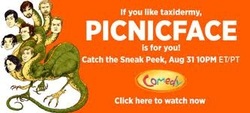 VIVIENO CALDINELLI'S RECENT PROJECT PICNICFACE on the comedy network Picnicface (not Picnicfeast) is coming at you with the Series Premiere Sept. 21 at 10:30pm et/pt. Picnicface is a fast-paced, mash-up comedy mixing a contemporary, Pythonesque animation and absurd sketch comedy. Hailing from Halifax, Nova Scotia, the eight-person sketch troupe consists of Andrew Bush, Kyle Dooley, Cheryl Hann, Mark Little, Brian Eldon Macquarrie, Evany Rosen, Scott Vrooman and Bill Wood. Veteran Canadian comedy master Mark McKinney is Executive Producer and Showrunner. |
Rusty Talk
Rusty Talk Editor: Archives
November 2017
Categories
All
|

 RSS Feed
RSS Feed
